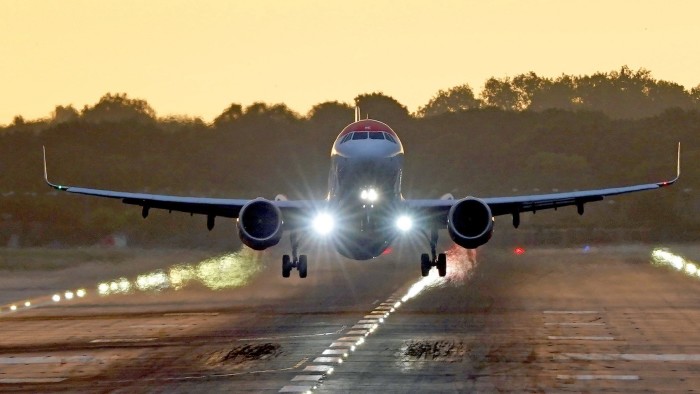Unlock the Editor’s Digest for free
Roula Khalaf, Editor of the FT, selects her favourite stories in this weekly newsletter.
Ministers are preparing to give the go-ahead to a major expansion of Gatwick, the UK’s second-largest airport, as part of a broader push to nurture economic growth.
The government is also keen to approve an expansion of Luton airport if concerns about noise pollution from passenger jets flying over rural areas can be addressed.
And chancellor Rachel Reeves is set to reaffirm her support for Heathrow, the UK’s largest airport, to build a contentious third runway in a speech about economic growth later this month, according to officials. But such a project could be a long way off being realised.
Ministers are planning to unveil more proposals to aid growth. The UK economy expanded by 0.1 per cent in November, following 0.1 per cent contractions in both October and September, according to official data.
Investor fears about stagflation — when sluggish growth combines with persistent price pressures — contributed to a sharp rise in UK government borrowing costs at the start of the year, although gilt yields fell last week amid expectations of more interest rate cuts.
The expansion of Britain’s airports has long been a controversial issue, given jets contribute to noise and air pollution, as well as climate change, but two government decisions are expected soon.
Transport secretary Heidi Alexander must decide by February 27 on Gatwick’s plan to bring its standby runway into regular use.
The work is part of a £2.2bn project that would enable Gatwick to handle up to 75mn passengers a year by the late 2030s, up from the record 46.5mn who used the single-runway airport in 2019.
One person familiar with the government’s thinking said a go-ahead for the scheme was an “absolutely sure thing” given its economic benefits and relatively straightforward environmental challenges.
Gatwick referred to a previous statement in which it said it had put forward a “strong” case for making best use of its existing infrastructure, while minimising noise and environmental impacts.
Alexander must rule by April 3 on Luton airport’s proposals to increase passenger numbers to 32mn each year, up from its current annual limit of 18mn.
Government insiders said Luton’s expansion was likely to be approved, but officials are working through how to address concerns about the extra noise impact over the Chiltern Hills, which are designated as an area of outstanding natural beauty.
Alberto Martin, chief executive of Luton airport, said expansion of the facility “fully aligns with the government’s sustainable growth agenda by making best use of existing infrastructure”, and would create thousands of jobs.
Reeves said last July she wanted Heathrow to expand so long as it met certain environmental criteria, a stance that puts her at odds with energy secretary Ed Miliband and London mayor Sadiq Khan.
One government insider said Heathrow’s third runway remained a “chicken and egg” situation, with the company’s management refusing to commit to the project unless and until it received full backing from ministers.
Labour has said it would allow Heathrow’s expansion if it passed four “tests” set by ministers relating to climate change, noise, air pollution and economic growth.
But experts doubt Heathrow could pass all the tests even if there were rapid growth in the fledgling market for “sustainable aviation fuel” made from crops and other non fossil fuels.
“There are live development consent orders on Luton and Gatwick but it’s worth mentioning there is no live proposal from Heathrow,” said one government official involved in the discussions.
Bloomberg reported Reeves could use her growth speech to announce some of the government’s key decisions on infrastructure projects, and that she could look favourably on a development consent order for a third runway at Heathrow.
Heathrow said growing the economy meant adding capacity at the airport. “That’s why we’re planning to unlock capacity by improving and upgrading our existing infrastructure, while also looking at potential options to deliver a third runway at Heathrow in line with strict tests on carbon, noise and air quality.”
Another transport project which is set to get the go-ahead from ministers in the coming months is the £9bn Lower Thames Crossing, a new highway and tunnel across the river to the east of London, according to officials.
Reeves is expected to use a private finance model for the crossing, with investors securing returns in exchange for bankrolling the project.
A government spokesperson said Labour was determined to get the economy moving and secure the long-term future of the UK’s aviation sector.
“All expansion proposals must demonstrate they contribute to economic growth . . . while remaining in line with existing environmental obligations,” they added.




